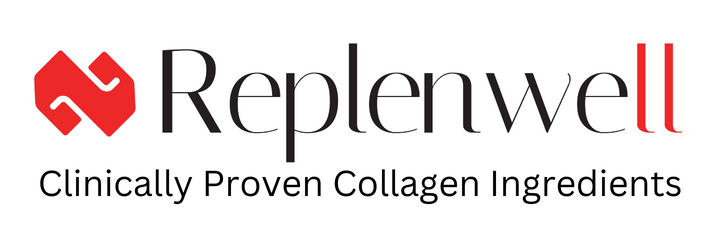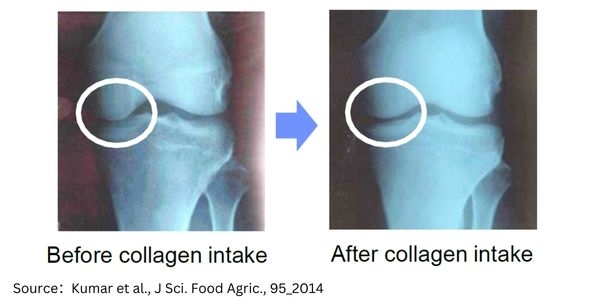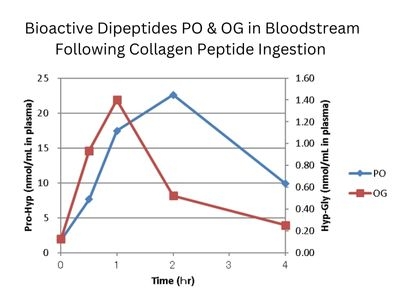Promotional Features
Joint Support Supplementation: How Collagen Innovation Brings Personalization to New Heights
The Future of Personalized Nutrition
A buzz-worthy trend that’s likely here to stay, nutritional personalization is simply the product of an individual’s wellness priorities and preferences. By engaging in a holistic approach that draws from diet, lifestyle, and physiological markers, wellness seekers can tailor their journeys to optimal well-being. As the name suggests, personalized, or precision nutrition, varies greatly from person to person. However, supplementation with bioactive proteins, such as collagen peptides, is a common strategy to maximize the benefits of an active lifestyle. According to recent market intelligence1, the global personalized-nutrition market was valued at $14 billion in 2021 and is projected to reach $37 billion by 2030, nearly tripling in the span of a decade. As consumers continue to seek the holy grail of truly personalized nutrition, there are many factors at play including age, preexisting conditions, current activity level, future activity goals, price constraints, and format preferences, just to name a few.
A Universal Desire for Healthy, Comfortable Joints
At the same time, joint health remains a top priority for consumers throughout the world. According to a 2022 IPSOS survey2 of 5,000 consumers throughout 7 countries, 73% reported joint support as a “prioritized aspect of wellbeing.” Comfortable mobility is also a goal that spans the consumer continuum. From older demographics looking to improve quality of life and maximize health span to active athletes seeking a competitive edge, joint support is a major component of many personalized nutrition plans. Understanding how collagen peptide ingredients can be utilized for a wide range of consumer demographics and application formats within the joint supplement category is key to the creation of winning formulations and leading-edge brands.
Collagen-Derived Dipeptides as Keys to Physiological Functionality
While the market may seem flooded with collagen ingredients options, not all collagen peptides are created equal. Bioactive dipeptides proline-hydroxyproline (PO) and hydroxyproline-glycine (OG) which are naturally present in collagen peptides, have been found to be the keys to unique physiological affects within the body related to skin3, bone4, and joint5 health. Following ingestion of collagen peptides, these compounds were identified at high levels within the human bloodstream6 and maintained in circulation for extended periods of time compared to the other hydroxyproline-containing di- and tripeptides measured7.
As leaders in collagen innovation, Nitta Gelatin is proud to be the only ingredient supplier to offer collagen peptides with concentrated levels (>3000 ppm) of PO and OG to the North American marketplace, under the Wellnex Replenwell brand. This is done through proprietary enzymatic processes yielding collagen peptides with 30X the PO-OG compared to collagen peptides created through traditional manufacturing methods. Collagen peptide ingredients with concentrated levels of PO and OG have been found to elicit greater skin8,9 and joint10 benefits when compared to standard collagen peptides (<100 ppm).
In vitro studies5 using chondrogenic ATDC5 cells help illuminate the mechanisms of action related to Replenwell collagen peptide supplementation and joint benefits, showing significant reductions in alkaline phosphatase (ALP), a factor promoting undesirable calcification of cartilage, along with significant increases in aggrecan, an important cartilage lubricant.
How Collagen Peptides Address Mobility Goals for Consumers 50+
Comfortable mobility, or lack thereof, has a major influence on activity level, general health, and quality of life. As we age, the propensity for joint pain increases due to a combination of factors, including cumulative wear and tear, reduced joint lubrication, and cartilage quality degradation. For those with diagnosed Osteoarthritis (OA), even everyday movement can be particularly painful. The pathology of OA involves the whole joint in a disease process that includes focal and progressive cartilage loss with concurrent changes in the bone underneath the cartilage. While pharmaceuticals are often a first line of defense against the unwanted effects of OA, there is a growing interest in dietary supplementation as alternatives to, or add-on therapies used in conjunction with, traditional medications for OA management.
The past decades have seen a renewed focus on opportunities for collagen peptide supplementation for OA management, with the number of clinical and preclinical studies on the topic growing exponentially. Nitta’s first double blind, placebo controlled, randomized human clinical study11 was published in 2014. This successful trial explored the effects of 5g Wellnex Replenwell™ collagen peptides, taken twice daily by OA sufferers. Results showed significant reductions over 13 weeks’ supplementation in the primary end points of Western Ontario and McMaster Universities Arthritis Index (WOMAC) and Visual Analogue Scale (VAS) scores in the collagen group, while those of the placebo were unaltered. Additionally, all score levels of WOMAC, VAS, and Quality of Life (QoL) decreased significantly (P<0.01) in the collagen peptide group compared to placebo group over the duration of the study.
Since this original clinical study, Nitta researchers have gone on to team with top universities and medical groups to carry out two more gold-standard human clinical trials for those with diagnosed OA. The results of a 2022 trial show joint support benefits for OA sufferers at the lowest dosages ever seen for bovine collagen peptides. Slated for publication this summer, this most recent study10 found that 2.5 grams daily Wellnex Replenwell bovine collagen peptides (PO-OG >3000 ppm) work similarly to 10 grams of standard bovine collagen peptides, considering multiple outcomes including WOMAC and QoL scores.
Collagen Peptides Overcome Training Hurdles for Active Athletes
On the other side of the activity spectrum, joint comfort takes priority from a performance and recovery perspective. Active athletes look to dietary supplements for extra support as they push their joints to the limit. According to the Council for Responsible Nutrition 2022 Consumer Survey on Dietary Supplements, sports nutrition supplementation usage was up significantly in recent years, from 34% of respondents in 2021 to 39% in 2022.
Nitta Gelatin teamed up with Josai University (Japan) in 2019 to better understand the affects of Wellnex Replenwell collagen peptide supplementation on healthy, long-distance collegiate athletes at the start of their training season. At a dosage level of 5 grams daily, knee pain was significantly lower for the collagen peptide group when compared to the placebo group, after 4 weeks intervention12. Additionally, 3-Methylhistidine, a muscle breakdown marker, showed significantly higher values in the placebo group compared to baseline over the same period. For those receiving collagen peptide supplementation, there was no significant difference in the test period compared to baseline. Results of this first-of-its kind study support the use of collagen peptides to help athletes get over the initial pain and inflammation associated with the beginning of a training regimen.
Flavor and Format Preferences Remain Priorities for Personalized Nutrition Plans
While researchers and product developers remain focused on providing solid, science-based nutritional solutions, it’s important not to lose sight of user experience. In addition to tangible joint support benefits backed by clinical substantiation, consumers also demand flavor, convenience, and price points that suit their needs. Trending formats for joint support include ready-to-mix (RTM) powders, ready-to-drink (RTD) beverages, gummies, chews, gels, bars, and capsules.
Wellnex Replenwell collagen peptides open the doors to new product innovation within the joint support arena. A minimum effective dosage of just 2.5 grams daily allows product developers to formulate for convenience with reduced serving requirements. Additionally, these products are offered in both powdered and agglomerated versions, allowing for optimum performance RTD or RTM applications.
Whether precision nutrition strategies call for a scoop of collagen peptides in a morning coffee, a protein bar on the go, or a gummy supplement, there is a Wellnex Replenwell ingredient to get brands to market faster and help them stay at the top of their game. Clinical research, ingredient optimization, and consumer education will continue to be drivers in the next generation of joint support supplements within the personalized nutrition arena.
Citations:
1. https://www.researchandmarkets.com/reports/5671081
2. IPSOS- Nutiani Survey - THE STATE OF HEALTH AND WELLBEING IN THE US - VOLUME 1, 2023
3. https://www.jstage.jst.go.jp/article/bbb/74/10/74_100193/_pdf
4. https://pubmed.ncbi.nlm.nih.gov/25285626/
5. https://pubmed.ncbi.nlm.nih.gov/19615963/
6. https://pubmed.ncbi.nlm.nih.gov/22040651/
7. https://pubmed.ncbi.nlm.nih.gov/16076145/
8. https://pubmed.ncbi.nlm.nih.gov/26840887/
9. https://www.nature.com/articles/s41598-018-29831-7
10. A double blind, prospective, multicentric, randomized, active and placebo controlled, five arm, clinical study to evaluate the efficacy, safety, and tolerability of high functional bovine collagen peptides as a nutritional therapy in the management of knee joint osteoarthritis in adults. Shajil Madhavan, Sheena Devasia, Jinu T Joseph, Stephena P., Seiko Koizumi, Liz Clarke, Sriraam V.T., publication pending (2023).
11. https://onlinelibrary.wiley.com/doi/abs/10.1002/jsfa.6752 12. https://libir.josai.ac.jp/il/user_contents/02/G0000284repository/pdf/JOS-03863603-47-1455.pdf



